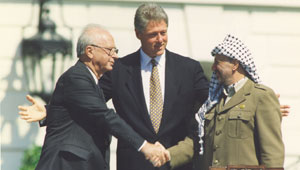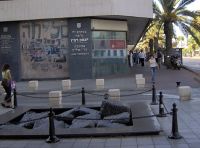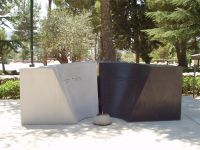Difference between revisions of "Yitzhak Rabin" - New World Encyclopedia
Mary Anglin (talk | contribs) (→Assassination and aftermath: hussein quote) |
Mary Anglin (talk | contribs) m |
||
| Line 15: | Line 15: | ||
}} | }} | ||
[[Image:Yitzhak Rabin.jpg|thumb|right|Yitzhak Rabin]] | [[Image:Yitzhak Rabin.jpg|thumb|right|Yitzhak Rabin]] | ||
| − | '''{{Audio|He-Yitzhak_Rabin.ogg|Yitzhak Rabin}}''' ( | + | '''{{Audio|He-Yitzhak_Rabin.ogg|Yitzhak Rabin}}''' (Hebrew: '''יִצְחָק רָבִּין'''), (March 1, 1922 |
| + | - November 4, 1995) was an Israeli politician and general. The fifth Prime Minister of Israel, he was also the Israeli Defense Force Chief of Staff, a former Ambassador to the United States and a member of the Knesset. | ||
| + | |||
| + | Rabin was the first native-born Prime Minister of Israel, the only Prime Minister to be assassinated and the second to die in office, following [[Levi Eshkol]]. | ||
| + | |||
| + | Yitzhak Rabin had the reputation of being a candid leader, direct and at times blunt. During his tenure both the [[Oslo Accords]] with the Palestinians and the [[Treaty of Peace with Jordan]] were signed. | ||
| + | |||
| + | He was assassinated on November 4 1995 while leaving a mass rally for peace by Yigal Amir, a right-wing activist who had strenuously opposed Rabin's signing of the Oslo Accords. | ||
==Youth and service in the Palmach== | ==Youth and service in the Palmach== | ||
Revision as of 23:44, 8 August 2006
| Yitzhak Rabin | |
| Yitzhak Rabin
| |
5th Prime Minister of Israel
| |
| In office 1974 – 1977 1992 – 1995 | |
| Preceded by | Golda Meir Yitzhak Shamir |
|---|---|
| Succeeded by | Menachem Begin Shimon Peres |
| Born | March 1 1922 Jerusalem, British Mandate of Palestine (now Israel) |
| Died | November 4 1995 Tel Aviv, Israel |
| Political party | Labor Party |
Yitzhak Rabin ▶ (Hebrew: יִצְחָק רָבִּין), (March 1, 1922 - November 4, 1995) was an Israeli politician and general. The fifth Prime Minister of Israel, he was also the Israeli Defense Force Chief of Staff, a former Ambassador to the United States and a member of the Knesset.
Rabin was the first native-born Prime Minister of Israel, the only Prime Minister to be assassinated and the second to die in office, following Levi Eshkol.
Yitzhak Rabin had the reputation of being a candid leader, direct and at times blunt. During his tenure both the Oslo Accords with the Palestinians and the Treaty of Peace with Jordan were signed.
He was assassinated on November 4 1995 while leaving a mass rally for peace by Yigal Amir, a right-wing activist who had strenuously opposed Rabin's signing of the Oslo Accords.
Youth and service in the Palmach
Rabin was born in Jerusalem in what was then Palestine (formal: British Mandate of Palestine). He grew up in Tel Aviv, where his family moved when he was one year old, and in 1940 he graduated with distinction from the Kadoori Agricultural High School. His matriculation was his last formal education, with the exception of some military strategy courses which he later took in the United Kingdom. He aspired to become an irrigation engineer.
In 1941, during his practical training at Kibbutz Ramat Yochanan, Rabin joined the Palmach section of the Haganah, and rose to the position of Chief Operations Officer in October 1947.
In 1948, the year of Israel's independence, Rabin married his wife, Leah.
IDF service
During the 1948 Arab-Israeli War, he directed Israeli operations in Jerusalem and fought the Egyptian army in the Negev.
In the late 1970s, when Rabin wrote his memoirs in Hebrew, Pinkas Sherut, he described an episode of the 1948 war that had troubled him ever since, the forced expulsion by the Israel Defense Forces (IDF) of 50,000 Arab civilians from the towns of Lod-Ramle. A cabinet committee which checks ministerial memoirs for security leaks ordered that the section be removed and indeed, against Rabin's wishes, it was. The story was revealed by the English translator of the book and published in "The New York Times" (see Yitzhak Rabin, Soldier of Peace - p.26).
In 1964 he rose to the position of Chief of Staff in the Israel Defense Forces (IDF).
Under his command, the IDF achieved an overwhelming victory over Egypt, Syria and Jordan in the Six-Day War in 1967. After the Old City of Jerusalem was captured by the IDF, Rabin was among the first to visit the old city, and then delivered a famous speech on the top of Mount Scopus at the Hebrew University. During the buildup to the war Rabin suffered a nervous breakdown, caused by mounting pressure over his inability to prevent it, and was incapacitated for 48 hours. His incapacitation was not disclosed to the public, and he resumed full command over the IDF.
Ambassador and Minister of Labor
Following his retirement from the IDF, he became a diplomat, serving as ambassador to the United States beginning in 1968. In 1973, he was elected to the Knesset as a member of the Labor Party, and was appointed Minister of Labor.
First term as Prime Minister
On June 2 1974, he was elected Party leader and succeeded Golda Meir as Prime Minister of Israel.
This term in office was most famous for Operation Entebbe, in which, on his orders, the IDF rescued passengers of a plane hijacked by Palestinian terrorists. Rabin resigned from office after two crises hit him: the arrival of four F-15 jets on Shabbat led to the breaking up of his coalition; and the exposure of a US Dollar bank account held by his wife Leah Rabin, an act forbidden at that time by Israeli currency regulators. Rabin took responsibility for his wife's account and resigned from office. Rabin was later hailed by many commentators for his resignation, who said that his resignation was a sign of integrity and responsibility.
Opposition MP and Minister of Defense
Following his resignation, Likud's Menachem Begin was elected in 1977. Until 1984 Rabin was a member of Knesset and a member of the Foreign Affairs and Defense Committee. These were difficult years for Yitzhak Rabin.
During the years 1984 to 1990 Rabin was a Minister of Defense in several unity governments under prime ministers Yitzhak Shamir and Shimon Peres. During these years the image of Rabin as "Mister Security" (Mar Bitachon) was strengthened on and beyond the Six Day War and Entebbe Operation.
When he came into office Israeli troops were still stationed deep in Lebanon since the Lebanon War. Rabin had the Israeli troops withdraw to a "Security Zone" on the Lebanese side of the Israeli border. In this area (and little beyond) the South Lebanon Army was active along with the Israeli forces. The withdrawal and "Security Zone" proved initially successful.
When the first Intifada broke out he first enacted harsh measures to break the riots. He was quoted as saying 'We should break their arms and legs', probably referring to Palestinian rioters. While the intifada continued Rabin's attitude softened and he became more convinced that the solution to the violence should be found around the negotiation table.
From 1990 to 1992 he was an MP and member of the Foreign Affairs and Defense Committee again. This time he used the opposition years to battle for the leadership of his party that Shimon Peres held since 1977.
Second term as Prime Minister
In 1992 Rabin was elected as chairman of the Israeli Labor Party. In the elections that same year his party, strongly focusing on the popularity of its leader, won a clear victory over the Likud of incumbent Prime Minister Yitzhak Shamir.
Rabin played a leading role in the signing of the Oslo Accords, which created the Palestinian Authority and granted it partial control over parts of the Gaza Strip and West Bank. Prior to the signing of the accords, Rabin received a letter from PLO Chairman Yasser Arafat renouncing violence and officially recognizing Israel, and on the same day Rabin sent Arafat a letter officially recognizing the PLO on September 9, 1993. (See: Israel-Palestine Liberation Organization letters of recognition.) During this term of office, Rabin also oversaw the signing of the Israel-Jordan Treaty of Peace (1994).
For his role in the creation of the Oslo Accords, Rabin was awarded the 1994 Nobel Peace Prize, along with Yasser Arafat and Shimon Peres. The Accords greatly polarized his image in Israeli society, some seeing him as a hero for advancing the cause of peace and some seeing him as a traitor for giving away land they saw as rightfully belonging to Israel. Also, Rabin's government was kept in office with the tacit support of Arab-Israeli parties in the Knesset.
Assassination and aftermath
On November 4, 1995, Rabin was assassinated by Yigal Amir, a right-wing radical who had strenuously opposed Rabin's signing of the Oslo Accords, after attending a rally promoting the Oslo process at Tel Aviv's Kings of Israel Square (which was renamed Yitzhak Rabin Square after his death). Rabin died of massive blood loss and a punctured lung on the operating table at the nearby Ichilov Hospital in Tel Aviv.
The assassination of Yitzhak Rabin was a shock for most of the Israeli public, which held rallies and memorials near the place of the assassination, his home, the Knesset and the home of the assassin. Rabin's funeral was attended by many world leaders, among them U.S. president Bill Clinton, Egyptian president Hosni Mubarak and King Hussein of Jordan.
At his funeral, King Hussein spoke thus: "He was a man of courage, a man of vision, and he was endowed with one of the greatest virtues that any man can have. He was endowed with humility. He felt with those around him, and in a position of responsibility, he placed himself, as I do and have done, often, in the place of the other partner to achieve a worthy goal. And we achieved peace, an honorable peace and a lasting peace. He had courage, he had vision, and he had a commitment to peace, and standing here, I commit before you, before my people in Jordan, before the world, myself to continue with our utmost, to ensure that we leave a similar legacy. And when my time comes, I hope it will be like my grandfather's and like Yitzhak Rabin's." [1]
A national memorial day for Rabin is set on his death date, and the square in which he was assassinated was named after him, as well as many streets and public institutions.
Today, Rabin is remembered by most as Israel's great man of peace, despite his military career. After his untimely death, Rabin was turned into a national symbol, especially for the Israeli left. There is some disagreement on the relation between his untimely death and the ensuing halt to the peace process and rise of the Israeli Right.
See also
- List of Nobel Peace Prize Laureates
- List of Israel's Chiefs of the General Staff
Further reading
- Benedikt, Linda: Yitzhak Rabin: The Battle for Peace, ISBN 190495006X.
- Horovitz, David (editor): Yitzhak Rabin, Soldier of Peace, ISBN 155704287X
- Kurzman, Dan: Soldier of Peace: The Life of Yitzhak Rabin, ISBN 0060186844
- Rabin, Yitzhak: The Rabin Memoirs, ISBN 0520207661
ReferencesISBN links support NWE through referral fees
- Dromi, Uri (Nov. 5, 2005). "Still craving peace 10 years after Rabin". New Straits Times, p. 20.
- "Israel marks Rabin assassination". (Nov. 5, 2005). BBC.
External links
- Memorial biography
- Official government biography
- The Yitzhak Rabin Center for Israel Studies
- Yitzhak Rabin Web Page
- Yitzhak Rabin profile, ynet news lexicon
- One of the last recorded interviews with Yitzhak Rabin - 6 minutes recorded interview with David Esing, One month before the assassination.
| Preceded by: Tzvi Tzur |
Chief of Staff of the Israel Defense Forces 1964-1968 |
Succeeded by: Chaim Bar-Lev |
| Preceded by: Golda Meir |
Leader of the Labor Party 1973-1977 |
Succeeded by: Shimon Peres |
| Preceded by: Golda Meir |
Prime Minister of Israel 1974-1977 |
Succeeded by: Menachem Begin |
| Preceded by: Moshe Arens |
Defense Minister of Israel 1984-1990 |
Succeeded by: Yitzhak Shamir |
| Preceded by: Yitzhak Shamir |
Prime Minister of Israel 1992-1995 |
Succeeded by: Shimon Peres |
| Preceded by: Moshe Arens |
Defense Minister of Israel 1992-1995 |
Succeeded by: Shimon Peres |
| Preceded by: Shimon Peres |
Leader of the Labor Party 1992-1995 |
Succeeded by: Shimon Peres |
| |||||||
| |||||
ar:إسحاق رابين bs:Jitzhak Rabin bg:Ицхак Рабин ca:Isaac Rabin da:Yitzhak Rabin de:Jitzchak Rabin es:Isaac Rabin eo:Jicĥak Rabin eu:Isaak Rabin fr:Yitzhak Rabin gl:Yitzhak Rabin hr:Yitzhak Rabin io:Ichak Rabin id:Yitzhak Rabin os:Рабин, Ицхак it:Yitzhak Rabin he:יצחק רבין lt:Ichakas Rabinas nl:Yitzhak Rabin ja:イツハク・ラビン no:Yitzhak Rabin pl:Icchak Rabin pt:Yitzhak Rabin ru:Рабин, Ицхак simple:Yitzhak Rabin sl:Jicak Rabin sr:Јицак Рабин fi:Jitzhak Rabin sv:Yitzhak Rabin tl:Yiẕẖaq Rabin vi:Yitzhak Rabin zh:伊扎克·拉宾
Credits
New World Encyclopedia writers and editors rewrote and completed the Wikipedia article in accordance with New World Encyclopedia standards. This article abides by terms of the Creative Commons CC-by-sa 3.0 License (CC-by-sa), which may be used and disseminated with proper attribution. Credit is due under the terms of this license that can reference both the New World Encyclopedia contributors and the selfless volunteer contributors of the Wikimedia Foundation. To cite this article click here for a list of acceptable citing formats.The history of earlier contributions by wikipedians is accessible to researchers here:
The history of this article since it was imported to New World Encyclopedia:
Note: Some restrictions may apply to use of individual images which are separately licensed.



